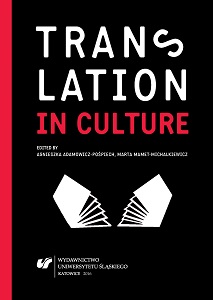Proportions of the Familiar and the Strange in Jasper Fforde’s Fictional World, from the Perspective of the Reader of the Original and the Polish Translation
Proportions of the Familiar and the Strange in Jasper Fforde’s Fictional World, from the Perspective of the Reader of the Original and the Polish Translation
Author(s): Agnieszka Pokojska
Subject(s): Language and Literature Studies, Studies of Literature, Other Language Literature, Translation Studies
Published by: Wydawnictwo Uniwersytetu Śląskiego
Keywords: familiar; strange; fictional world; English literature; reader’s perspective
Summary/Abstract: This article investigates the proportions of the familiar and the strange in the reception of books one and two of Jasper Fforde’s Thursday Next series in the original and in the Polish translation. It is argued that the world created by Fforde is an alternative reality comprising two distinct categories: that of objects and phenomena – both purely fictional and analogical to ones existing in the real world – and that of the classic works of literature written in English. Even though the latter requires knowledge of the cultural context, translation has proved possible, as evidenced by a number foreign-language editions. In languages other than English, however, and outside the English culture, the reception of Fforde’s fictional world is rather different than that of the original. The point of the article, illustrated by examples from Fforde’s texts, is that, unlike the reader of the original texts, who is bound to find the fictitious elements of the alternative universe strangest, and the realm of literature comfortingly familiar, the reader of the translation is likely to find the fictional world of Thursday Next uniformly unfamiliar: the literary elements, which are introduced by the author with lesser concern for the recipient’s comprehension than the products of his own inventiveness, must seem to a foreign reader at least as strange as the fictitious elements.
Book: Translation in Culture. Vol. I
- Page Range: 135-149
- Page Count: 15
- Publication Year: 2016
- Language: English
- Content File-PDF

